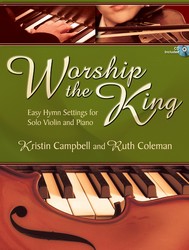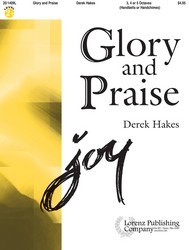- |
User Links
Glory to God, and Praise and Love

Glory to God, and praise and love
Author: Charles Wesley (1739)Tune: AZMON
Published in 3 hymnals
Playable presentation: Lyrics only, lyrics + musicAudio files: Recording
Representative Text
1. Glory to God, and praise, and love
Be ever, ever giv’n;
By saints below, and saints above,
The Church in Earth and Heav’n.
2. On this glad day, the glorious Sun
Of Righteousness arose;
On my benightened soul he shone
And filled it with repose.
3. Sudden expired the legal strife;
’Twas then I ceased to grieve;
My second, real, living life
I then began to live.
4. Then with my heart I first believed,
Believed, with faith divine,
Power with the Holy Ghost received
To call the Savior mine.
5. I felt my Lord’s atoning blood
Close to my soul applied;
Me, me he loved—the Son of God,
For me, for me he died!
6. I found and owned his promise true,
Ascertained of my part,
My pardon passed in Heav’en I knew
When written on my heart.
7. Oh, for a thousand tongues to sing
My dear Redeemer's praise!
The glories of my God and King,
The triumphs of his grace.
8. My gracious Master and my God,
Assist me to proclaim,
To spread thru' all the Earth abroad
The honors of thy name.
9. Jesus the name that charms our fears,
That bids our sorrows cease;
'Tis music in the sinner's ears,
'Tis life and health and peace!
10. He breaks the pow'r of canceled sin,
He sets the pris'ner free;
His blood can make the foulest clean,
His blood availed for me.
Source: Hymns and Devotions for Daily Worship #290a
Author: Charles Wesley
 Charles Wesley, M.A. was the great hymn-writer of the Wesley family, perhaps, taking quantity and quality into consideration, the great hymn-writer of all ages. Charles Wesley was the youngest son and 18th child of Samuel and Susanna Wesley, and was born at Epworth Rectory, Dec. 18, 1707. In 1716 he went to Westminster School, being provided with a home and board by his elder brother Samuel, then usher at the school, until 1721, when he was elected King's Scholar, and as such received his board and education free. In 1726 Charles Wesley was elected to a Westminster studentship at Christ Church, Oxford, where he took his degree in 1729, and became a college tutor. In the early part of the same year his religious impressions were much deepene… Go to person page >
Charles Wesley, M.A. was the great hymn-writer of the Wesley family, perhaps, taking quantity and quality into consideration, the great hymn-writer of all ages. Charles Wesley was the youngest son and 18th child of Samuel and Susanna Wesley, and was born at Epworth Rectory, Dec. 18, 1707. In 1716 he went to Westminster School, being provided with a home and board by his elder brother Samuel, then usher at the school, until 1721, when he was elected King's Scholar, and as such received his board and education free. In 1726 Charles Wesley was elected to a Westminster studentship at Christ Church, Oxford, where he took his degree in 1729, and became a college tutor. In the early part of the same year his religious impressions were much deepene… Go to person page >Text Information
| First Line: | Glory to God, and praise and love |
| Title: | Glory to God, and Praise and Love |
| Author: | Charles Wesley (1739) |
| Language: | English |
Glory to God, and praise and love. C. Wesley. [Praise for Salvation.] Written by C. Wesley on the first anniversary of the great spiritual change which he underwent on Sunday, May 21,1738, details of which are given under that date in his Journal. In 1740 it was included in Hymns and Sacred Poems, in 18 stanzas of 4 lines, and headed, "For the Anniversary Day of one's Conversion." (Poetical Works, 1868-72, vol. i. p. 299.) One of the first to make use of the hymn for congregational purposes was R. Conyers, who gave a cento therefrom in his Psalms & Hymns, 1767, beginning, "O for a thousand tongues to sing," and consisting of stanzas vii., ix.-xii. This was followed by other centos (all beginning with the same stanza), in the collections of De Courcy, 1775; Toplady, 1776; and many others. The most widely known cento is that by J. Wesley, in the Wesleyan Hymn Book, 1780, No. 1, in 10 stanzas, "O for a thousand tongues to sing." This is not only the opening hymn of the Wesleyan Hymn Book, but also of most collections of the Methodist bodies in all English-speaking countries. To this cause much of its popularity may be traced. Stevenson's annotations thereon in his Methodist Hymn Book Notes, 1883, are of more than usual interest. Another cento, "Look unto Christ, ye nations; own," is in the American Methodist Episcopal Hymns, 1849.
The opening line of the cento, "O for a thousand tongues to sing," is supposed to have had its origin in an expression of Peter Bohler, the Moravian, who, when consulted by C. Wesley about praising Christ, replied, "Had I a thousand tongues, I would praise Him with them all." The well-known line, "He breaks the power of cancelled sin," has given offence to a few, from the Taylor and Jones Psalms & Hymns, London, 1777, where it read, "He breaks the power of death and sin," to the American Manual of Praise, Oberlin, Ohio, 1880, where it reads, "He breaks the power of reigning sin." These changes, however, are limited in their use, the original text being usually retained.
--John Julian, Dictionary of Hymnology (1907)
Notes
Glory to God, and praise and love. C. Wesley. [Praise for Salvation.] Written by C. Wesley on the first anniversary of the great spiritual change which he underwent on Sunday, May 21,1738, details of which are given under that date in his Journal. In 1740 it was included in Hymns and Sacred Poems, in 18 stanzas of 4 lines, and headed, "For the Anniversary Day of one's Conversion." (Poetical Works, 1868-72, vol. i. p. 299.) One of the first to make use of the hymn for congregational purposes was R. Conyers, who gave a cento therefrom in his Psalms & Hymns, 1767, beginning, "O for a thousand tongues to sing," and consisting of stanzas vii., ix.-xii. This was followed by other centos (all beginning with the same stanza), in the collections of De Courcy, 1775; Toplady, 1776; and many others. The most widely known cento is that by J. Wesley, in the Wesleyan Hymn Book, 1780, No. 1, in 10 stanzas, "O for a thousand tongues to sing." This is not only the opening hymn of the Wesleyan Hymn Book, but also of most collections of the Methodist bodies in all English-speaking countries. To this cause much of its popularity may be traced. Stevenson's annotations thereon in his Methodist Hymn Book Notes, 1883, are of more than usual interest. Another cento, "Look unto Christ, ye nations; own," is in the American Methodist Episcopal Hymns, 1849.
The opening line of the cento, "O for a thousand tongues to sing," is supposed to have had its origin in an expression of Peter Bohler, the Moravian, who, when consulted by C. Wesley about praising Christ, replied, "Had I a thousand tongues, I would praise Him with them all." The well-known line, "He breaks the power of cancelled sin," has given offence to a few, from the Taylor and Jones Psalms & Hymns, London, 1777, where it read, "He breaks the power of death and sin," to the American Manual of Praise, Oberlin, Ohio, 1880, where it reads, "He breaks the power of reigning sin." These changes, however, are limited in their use, the original text being usually retained.
--John Julian, Dictionary of Hymnology (1907)
Tune
AZMONLowell Mason (PHH 96) adapted AZMON from a melody composed by Carl G. Gläser in 1828. Mason published a duple-meter version in his Modern Psalmist (1839) but changed it to triple meter in his later publications. Mason used (often obscure) biblical names for his tune titles; Azmon, a city south of C…


 My Starred Hymns
My Starred Hymns





